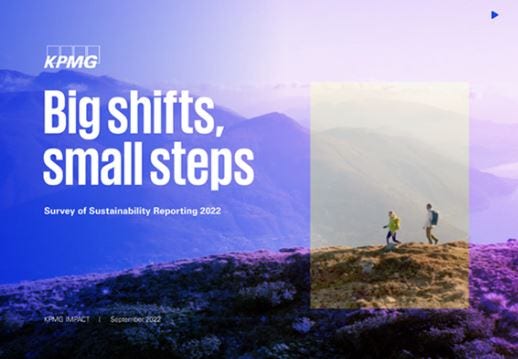Over the past three decades, sustainability reporting has been largely voluntary. KPMG’s surveys of sustainability reporting have offered meaningful insights on how to improve levels of disclosure for business leaders, sustainability professionals, and company boards.
Today, policymakers are on the precipice of adopting mandatory and regulated sustainability reporting and the reporting landscape is poised to change drastically. The findings in KPMG’s 2022 ‘Survey of Sustainability Reporting’ reflect on the current state of reporting and overarching business strategies that can enable companies to meet increasing regulatory expectations – all while creating impact and generating value for society.
The 2022 KPMG survey is one of the most comprehensive and authoritative pieces of global research on sustainability reporting, based on an analysis of financial reports, sustainability and Environmental, Social and Governance (ESG) reports, and websites from 5,800 companies in 58 countries, territories and jurisdictions.
It acts as a guide for those preparing their own organization’s sustainability report. It also supports investors, asset managers and ratings agencies who now factor sustainability or ESG information into their corporate performance and risk assessments.
The 2022 survey includes new topics that reflect the evolving nature of sustainability disclosures. New sections include the use of materiality assessments, along with reporting on social and governance risks. The findings indicate five major emerging trends in sustainability reporting:
- Sustainability reporting is growing incrementally with movement towards the use of standards framed by stakeholder materiality assessments
- There is increased reporting on climate-related risks and carbon reduction targets, in line with TCFD
- There is a growing awareness of biodiversity risk
- Reporting on the UN SDGs prioritizes quantity over quality
- Climate risk reporting leads, followed by social and governance risks.

96%
of G250 companies report on sustainability or ESG matters
64%
of the G250 acknowledge climate change as a risk to their business
Less than half of companies report on
biodiversity loss
GRI, TCFD and SDGs
form the most commonly used anchors for sustainability reporting
TCFD adoption nearly doubled in 2 years, going from
37% to 61%
among the G250
49%
of the G250 acknowledge social elements as a risk to their business, with Western Europe as the leading region
71%
of N100 companies identify material ESG topics
Fewer than half of G250 companies have leadership level representation for
sustainability
Key global trends in sustainability reporting
Sustainability reporting grows incrementally with movement towards the use of standards framed by stakeholder materiality assessments
An impressive 96% of the world’s leading 250 companies report on sustainability, a rate likely to increase as new regulations on non-financial reporting is introduced. Usage of global standards like GRI, SASB, and stock exchange guidelines have also increased, with the GRI the most dominant. A significant majority of reporting companies across both the N100 and G250 disclose their materiality.
Reporting on climate risk and carbon reduction
Increased reporting on climate-related risks and carbon reduction targets, in line with TCFD
Climate reporting is the most common form of disclosure ahead of social impact and governance risk. Nearly three-quarters of companies report their carbon targets and the number of companies reporting against TCFD has nearly doubled, leading to more consistent and comparable climate disclosure.
Reporting the risk from biodiversity loss
Growing awareness of biodiversity risk
2022 is a pivotal year for nature and biodiversity with international efforts stepping up to halt biodiversity loss. Despite growing awareness of biodiversity loss as a critical issue, less than half of companies recognize this loss as a risk to the business. On the positive side, most sectors now acknowledge this risk, even many of those that can be considered low risk. The launch of the Taskforce on Nature-Related Financial Disclosure (TNFD) and Corporate Sustainability Reporting Directive (CSRD) frameworks are expected to drive up reporting across countries and sectors in the immediate years.
Reporting on the UN Sustainable Development Goals (SDGs)
UN SDG reporting prioritizes quantity over quality
The majority of companies report on SDGs, with 10 percent of companies reporting against all 17 SDGs. Three SDGs remain the most popular for companies: 8. Decent Work and Economic Growth; 12. Responsible Consumption and Production; and 13. Climate Action.
Companies increasingly acknowledging ESG issues as risk areas
Climate risk reporting leads, followed by social and governance risks
An increasing proportion of companies acknowledge that climate change is a business risk. However, less than half of companies report on social and governance risks to their business. In general, the description of these risks are overwhelmingly narrative-driven and do not quantify the financial impact on these risks on companies or on society.
Sustainability continues to become a priority for company leadership but there is room for improvement. Only one third of companies in the N100 have a dedicated member of their board or leadership team responsible for sustainability matters. Compensation conditions related to sustainability outcomes for leadership teams are prevalent for only 40 percent of G250 companies.
Survey of Sustainability Reporting

"Companies need to continue to make urgent progress with ESG reporting in a way that supports their short-term and long-term business objectives."
John McCalla-Leacy
Head of Global ESG, KPMG International and Head of ESG
KPMG in the UK




